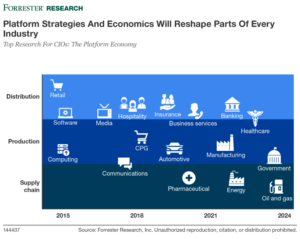The Platform Economy — What CIOs Need To Know
Nary a day goes by without someone talking about their efforts to build a platform. We cannot argue: Platforms can contribute massive value to customers, the ecosystem, and the company that creates the platform. More so, as a consumer, I rely on platforms for so much of my working life that I often don’t even realize it. Not being a fan of shopping, I use Amazon to meet my needs when it comes to buying essentials, fun things, or sending a present. When I commute, Waze provides the information I need to optimize my trip. When I travel, platforms like Booking.com and Uber get me to where I am going in a cost-effective fashion. Yes, the examples I cite are digitally native; however, that doesn’t mean that more traditional firms cannot match or improve. SAP’s Concur is an example of a traditional firm moving into the platform business. And GE’s Predix is another, although success has yet to be defined.
Today’s CIO has to recognize the value of platforms and plot a course for the firm to succeed with a platform strategy. Just because there may be a dominant platform in your market doesn’t mean you can’t be successful. As long as you are solving customer and ecosystem problems, your platform can be a success. To learn more, please read the latest report from Ted Schadler and me. You can find it here: “Top Research For CIOs: The Platform Economy“
